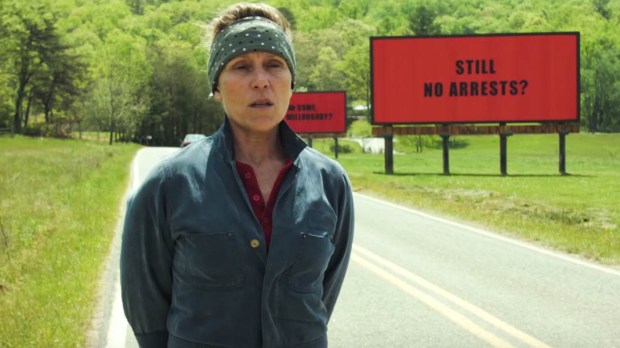Lenten Campaign 2025
This content is free of charge, as are all our articles.
Support us with a donation that is tax-deductible and enable us to continue to reach millions of readers.
Playwright and filmmaker Martin McDonagh’s new film Three Billboards Outside Ebbing, Missouri has received the Golden Globe for the best film of 2017 and more than a few people aren’t happy about it. The reasons why probably say some things about where we are as a people at the moment, not just politically, but perhaps spiritually as well.
The story begins roughly seven months after an event we are never shown, the horrific rape and murder of a teenage girl. Enraged by the lack of progress in finding the killer, the girl’s mother Mildred (Frances McDormand) decides to shame the local authorities into further action. To this end, Mildred rents three billboards located on the outskirts of town and places messages on them which read in order “Raped while dying,” “And still no arrests?” “How come, Chief Willoughby?”
As Willoughby (Woody Harrelson) is a beloved figure in the small town of Ebbing, the billboards set off a firestorm of controversy, with most of the populace siding against Mildred. Her most vitriolic detractor is Deputy Jason Dixon (Sam Rockwell), a vicious bigot who is widely believed, though never proven, to have tortured a black inmate at the jail. Dixon does little to hide his intentions towards Mildred and her supporters should the billboards remain in place.
Willoughby himself is more understanding, but insists that the lack of clues and leads leave him helpless to do more than he has. Nevertheless, as he is dying painfully from cancer, Willoughby does his best to convince Mildred to take down the billboards so his remaining time on Earth won’t be spent under a cloud of insinuation. Mildred refuses and the situation worsens, eventually turning violent after Willoughby decides to take his own life rather than suffer any more pain. Before he does so, however, Willoughby pens letters to all the parties involved in the hope that the missives will help resolve the situation before it reaches its inevitable outcome.
What follows the reading of the letters, particularly the one left to Dixon, is the reason the film has become so divisive. Without revealing too much, the messages Willoughby leaves behind basically ask the characters to find a way to forgive one another for all that has come before. That sounds nice, but there’s some problems.
You see, up to this point in the story, every character introduced, with the possible exception of Mildred’s son Robbie (Lucas Hedges), has been unlikable to some degree. Mildred is consumed with anger, completely unreasoning, and oblivious to the suffering of others. Willoughby, though often sympathetic, has been turning a blind eye to people in his department like Dixon. And as for Dixon, he’s a borderline sociopath whom we have seen brutally inflict pain on innocent people. In short, there are no heroes to root for in Three Billboards Outside Ebbing, Missouri.
That, in itself, is not unsurmountable. As moviegoers, we are used to redemption arcs, even for despicable characters. But those arcs don’t follow their traditional paths in Three Billboards. For one thing, no one is made to pay for their transgressions. That might get a pass if it were just Mildred and Willoughby we were being asked to let off the hook. However, the movie expects the characters and the audience to allow Dixon a reprieve as well. In a year when Black Lives Matter was on the front page every other day, it seems unthinkable for a film to offer a way for someone like Dixon to escape his comeuppance, but this one does. That alone has made the movie a no-go for many.
But there’s more. The other difficulty the movie presents is that while it offers a path to redemption of sorts for its characters, it doesn’t really require them to become any more likable in the process. While they all are seeking to give and receive forgiveness, their basic personalities don’t change by the time the end credits roll. Every character to some extent remains a jerk, or worse. Three Billboards Outside Ebbing, Missouri starts with no heroes, and it ends with none.
Just what kind of crummy movie is this? What were the filmmakers thinking? Who in their right mind presents us with a bunch of unlikable people and, with no guarantee that they will be punished in this life for their wrongdoings and no requirement that they change their basic personality, asks us to forgive them for the things they’ve done, no matter how horrible? Who would ask so hard a thing?
Oh, wait.
The film never references that particular line in the Our Father about forgiveness, but it does present us with a story full of people and situations which tests our resolve to live out that line. While that alone may not make Three Billboards Outside Ebbing, Missouri the best movie of 2017, it certainly makes it one worth watching, especially at this time in history when forgiving those on the other side, whatever that may be, isn’t necessarily the go-to strategy.

